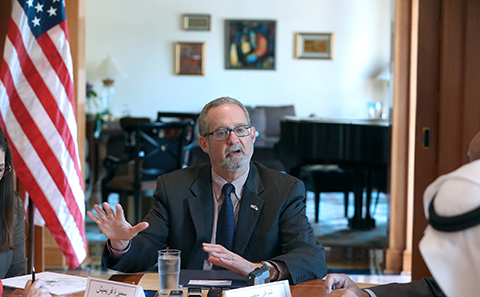 KUWAIT: US Ambassador to Kuwait Lawrence Silverman speaks to reporters at the US Embassy in Bayan. — Photo by Yasser Al-Zayyat
KUWAIT: US Ambassador to Kuwait Lawrence Silverman speaks to reporters at the US Embassy in Bayan. — Photo by Yasser Al-ZayyatKUWAIT: US Ambassador to Kuwait Lawrence Silverman assured relations between Kuwait and the United States will remain strong and strategic despite a change in administrations. Silverman told reporters President-Elect Donald Trump is still crafting policies for his new administration, and the attitude of US embassies worldwide is to "wait and watch". "Bilateral relations are extremely important, rather than only focusing on defense and security. The president-elect has met outgoing President Barack Obama, and has been briefed about local and international issues," he said.
Many governments in the Gulf have voiced concern over Trump's comments on immigrants and Muslims, but Silverman stressed relations between the US and Gulf countries are extremely important. "We have two US-GCC summits annually, along with meetings and dialogues," he said. Silverman thanked the Kuwaiti people and HH the Amir Sheikh Sabah Al-Ahmad Al-Sabah for the warm welcome accorded to him as the new US ambassador to Kuwait.
"It's been a great two months in Kuwait and a great honor. Our work is a reflection of what President Obama and HH the Amir want us to do, to make our ties even closer and address trade, political, education and cultural issues. We want the Kuwaiti people to see the mutual benefits of what Kuwait and the US do, not only in defense and security, but for the greater security of the region," he added.
There are more than 30,000 Kuwaitis in the US, according to Silverman, about half of whom are students. "We welcome more Kuwaitis and we are very happy because of their positive experience in the US. They study in the US and come back to Kuwait to contribute to the society and economy. I presented my credentials to HH the Amir and met high-ranking officials at the ministry of foreign affairs, defense, interior, education, labor and information, and I appreciate the cooperation I have with these officials. We also had a few trade missions in Kuwait this year on health, education, security and safety," he pointed out.
Silverman was asked about recent cases of Kuwaiti students arrested in the US for having videos and photos on their laptops and mobiles that were deemed inappropriate. "Kuwait has around 15,000 students in the US, and a very tiny number of students have experienced this problem," he explained. "These cases are being highlighted on social media, but even American citizens are questioned by the authorities, and not just foreigners. They are not being arrested because they are Kuwaitis, or because they are Arabs or Muslims," he emphasized.
Silverman said a majority of these cases are related to students who quit their studies but do not change their status. "When you go back to America and have not changed your status, you'll be questioned. If you are a student, please coordinate with your school. If you have credit hours, you have to follow up - these are university regulations. The government of Kuwait is mostly paying their expenses, so when they send students abroad, they expect them to study. So my advice to Kuwaiti students is please change your status if you are no longer a student. If you have any issues, you have to inform the university about it," he explained.
Silverman spoke about his meeting with HH the Amir during the opening of the new Jaber Al-Ahmad Cultural Center. "It's more than an opera house - it's for theater, film and music. I understand it will be an educational center too. I was impressed as the building itself is state-of-the-art and a work of art. It will help put Kuwait on the global cultural map. It is very important that we have cultural exchanges," he added.
The US envoy also hailed Kuwait's humanitarian work, which he said has helped many people around the world. "I believe Kuwait plays an important role in humanitarian work. Before coming here as US ambassador, I came three times as a US representative, as Kuwait hosted many pledging conferences for Syrian refugees and for countries hosting refugees. We really appreciate the Kuwaiti role. Kuwait also co-sponsored the refugee conference in London, where HH the Amir was recognized, and the UN Secretary General was there too. It reflects the generosity of the Kuwaiti people. It does make a difference," he concluded.
By Ben Garcia








